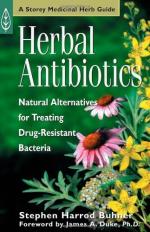|
This section contains 718 words (approx. 3 pages at 300 words per page) |

|
Antibiotics are natural or synthetic compounds that kill bacteria. There are a myriad of different antibiotics that act on different structural or biochemical components of bacteria. Antibiotics have no direct effect on virus.
Prior to the discovery of the first antibiotic, penicillin, in the 1930s, there were few effective ways of combating bacterial infections. Illnesses such as pneumonia, tuberculosis, and typhoid fever were virtually untreatable, and minor bacterial infections could blossom into life-threatening maladies. In the decades following the discovery of penicillin, many naturally occurring antibiotics were discovered and still more were synthesized towards specific targets on or in bacteria.
Antibiotics are manufactured by bacteria and various eukaryotic organisms, such as plants, usually to protect the organism from attack by other bacteria. The discovery of these compounds involves screening samples against bacteria for an inhibition in growth of the bacteria. In commercial settings, such screening has been automated...
|
This section contains 718 words (approx. 3 pages at 300 words per page) |

|


